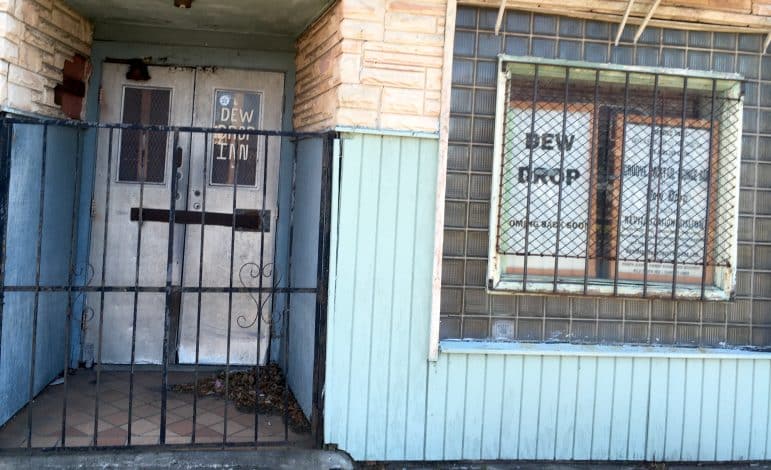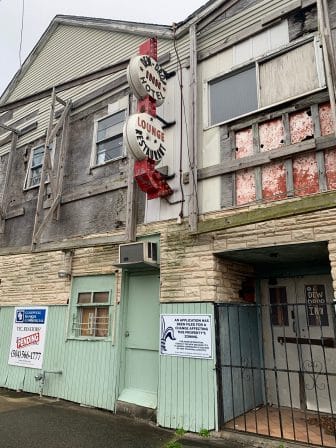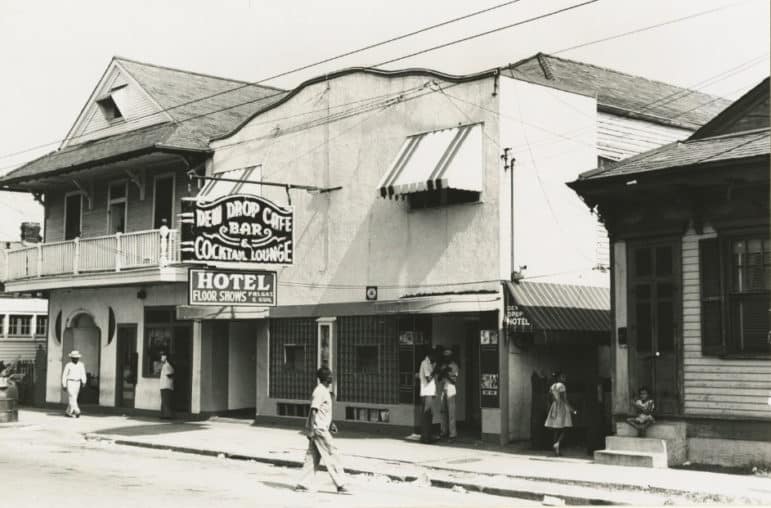
The window at 2836 La Salle St. tells of an earlier attempt to revive the Dew Drop. (Uptown Messenger)
Plans to revive the historic Dew Drop Inn music venue and hotel in Central City moved another step forward last week with the City Council’s unanimous approval.
“Putting this back into commerce is a wonderful, wonderful thing,” said District B Councilman Jay Banks before the conditional use application went up for a vote. “It adds to the musical legacy of the wonderfully musical city that we have. I am extremely excited about this.”
The council attached 11 provisos to the approval to make sure the developer will provide a passenger drop-off zone, noise abatement, a landscape plan and other city requirements, but no off-street parking is required of the development.
The city’s leading Black music venue for three mid-century decades, the Dew Drop holds a hallowed place in New Orleans cultural history. It was not just a music venue, it was a welcoming barbershop, restaurant, bar, hotel and ad hoc community center for Black musicians, both local and national.
Like other cabarets on the “Chitlin’ Circuit,” venues for Black entertainment in the segregated South, the Dew Drop Inn hosted stars such as Duke Ellington, Nat King Cole, James Brown, B.B. King, Ray Charles, Ike and Tina Turner, Otis Redding and Sam Cooke — along with a floor show featuring vaudeville-style acts like comedians, magicians and a peg-legged tap dancer.
It also nurtured a generation of noteworthy local musicians. Its house band, led by Dave Bartholomew and Edgar Blanchard, featured such luminaries as Allen Toussaint, Irma Thomas, Earl King, James Booker, Charles Neville, Earl Palmer, Tommy Ridgeley, Huey “Piano” Smith and Deacon John Moore.
“There’s way too many for me to name all who entered those doors and performed there,” Banks said.
The business founded by entrepreneur Frank Painia during the Depression had its glory days in the 1940s, ’50s and ’60s but continued to operate as a hotel until 2005, when the building sustained damage during Hurricane Katrina.

City Planning Commission photo
The former Dew Drop Inn
The building at 2836 La Salle St. is in the La Salle Street Overlay District, established in the 2015 zoning ordinance “to create an environment with additional opportunities for live entertainment at commercially zoned sites along commercial corridors, as well as at small sites with commercial zoning that are interspersed within neighborhoods where arts and cultural uses have historically existed.” In other words, so that places that the Dew Drop can be revived.
“This is totally in keeping and accomplishes the purpose of the overlay district,” said city planner Stephen Kroll, introducing the proposal at Thursday’s meeting. “It is a historically significant site and it will help restore commerce along La Salle Street. So the Planning Commission is really effusively in support of it.”
Banks noted that it was the first time he has heard the City Planning Commission’s support described as “effusive,” and he echoed the sentiment.
Despite its support from the city, developers have had difficulty finalizing previous plans to restore the dilapidated 16,590-square-foot building. Bringing the building back into commerce is expected to take millions of dollars, and the fundraising has repeatedly fallen short.
Painia’s grandchildren — Kenneth Jackson, Melanie Painia, Dominick Gusman and James Spears — recently sold 2836 La Salle to developer Curtis Doucette, a New Orleans native and founding partner of Iris Development. He specializes in eradicating blight and developing affordable housing, projects that require creative financing techniques.
He’s planning to develop a hotel with a pool, a music venue and bar, and a retail space that could become a coffee shop. The restoration will be historically accurate, he said, most likely recreating the facade from the 1950s.

A photo by Ralston Crawford shows the Dew Drop Inn in 1952. (Courtesy of Tulane Digital Library)
In keeping with historical accuracy, the development received a waiver to allow a sign that does not conform to current signage requirements. The City Planning Commission also stipulated 10 provisos requiring adherence to noise restrictions as well as landscaping, design, screening, traffic control and other city standards.
There will be no off-street parking for the hotel and music club.
“The demand for parking is expected to increase in the evenings when live performances are most likely to take place and anytime the demand for hotel accommodations increases in response to seasonal and other events,” the City Planning Commission staff states in the report. “There is ample on-street parking on La Salle, 6th, and South Liberty Streets, as well as on Washington Avenue; however, the hotel’s patrons are more likely to travel to and from the hotel via taxicab, ride-share services, or other means besides private vehicle.”
Banks added an 11th proviso requiring a designated passenger zone where cabs, ride-shares and shuttle buses can drop off and pick up guests.
“We will continue to work with neighbors to make sure their voices are heard,” Banks said, “so this will be truly an asset and not a problem.”